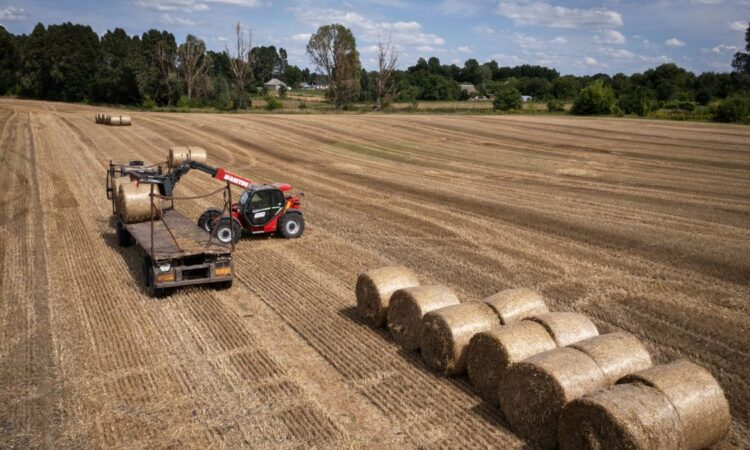Brussels proposes to extend EU-Ukraine free trade. But restrictions on grain will be easier to slap

The European Commission proposed on Wednesday to extend free trade with Ukraine until June 2025, but with a new tweak to enable the type of national restrictions that Kyiv has complained about.
The U-turn means that if one or several member states face a glut of Ukrainian agricultural products, Brussels could give the green light to limit the sale and storage of these products inside the affected country. An all-out ban will also be possible, as the proposed law has been deliberately drafted in open-ended terms.
The so-called “remedial measures” will have to be backed by economic evidence, which is prone to be heavily influenced by political considerations. Once approved, the restrictions will last for as long as the market turmoil takes place.
Additionally, the Commission has pitched a new safeguard to keep in check the “most sensitive products” coming from Ukraine, namely poultry, eggs and sugar. If these import volumes increase above the levels seen in 2022 and 2023, an emergency brake will automatically kick in and pre-war tariffs will be re-introduced.
Maize and wheat, the most traded goods, will not be considered “sensitive” because the European market is traditionally receptive to these flows, while the surge in poultry, eggs and sugar has vastly defied historic patterns.
Speaking to reporters, Margaritis Schinas, one of the Commission’s vice-presidents, defended the new regime, arguing it strikes a balance between support for Ukraine and the concerns raised by Eastern countries and the agricultural sector.
“Whilst our monitoring has not shown any adverse effects on the EU market as a whole, we are aware that these Ukrainian imports can have some adverse effects which are more localised,” Schinas said.
Although the final decision to restrict trade and impose tariffs will rest on the Commission, member states will have a “greater role” in the process and be able to submit recommendations and advice, he added. “This allows for more ownership.”
Wednesday’s announcement comes as farmers take to the streets in Germany, France and Belgium to denounce the cost-of-living crisis, the phase-out of tax breaks, late payments of subsidies, environmental regulation and loss of competitiveness.
The growing movement, which the far right is trying to exploit in its electoral favour, has put Brussels under intense scrutiny and cast doubt over its ambitious Green Deal.
Asked if the discontent had any bearing on the hardened proposal, Schinas refused a direct cause-effect relation but expressed the “highest respect” for the protesters. “European farmers know that they have no better ally in safeguarding their income than the European Commission,” he said.
The draft regulation has to undergo negotiations between the Council and the European Parliament before coming into force.
Grain, a long-running saga
Ukraine is one of the world’s leading exporters of essential commodities such as sunflower oil, barley, maize and wheat. Russia’s all-out war against the country and subsequent blockade of the Black Sea severely hindered the country’s ability to ship out its goods, raise a crucial source of revenue and access foreign currency.
In June 2022, Brussels lifted all tariffs and quotas on Ukrainian imports to ease the transit via land routes and provide an easy alternative to the Black Sea. But the free-trade regime led to a surge in Ukrainian cereals across neighbouring countries, triggering protests from local farmers, who said the low-cost produce was bringing down prices, filling up storage and causing unfair competition.
The dispute erupted in April 2023, when Poland, Hungary and Slovakia slapped overnight national bans on a range of agricultural products coming from Ukraine. Romania and Bulgaria quickly warned they would follow suit.
Caught off guard, the Commission struck back, denouncing the prohibitions as unacceptable, unlawful and contrary to the bloc’s spirit of solidarity. A group of 12 countries, including Germany, France, the Netherlands and Belgium, said in a joint letter that the single market’s integrity was in danger.
The standoff played out for months and saw multiple attempts to resolve the situation through diplomacy. But the bans never fully went away, forcing Kyiv to file a lawsuit before the World Trade Organization (WTO).
Currently, Poland, Hungary and Slovakia apply various restrictions for the consumption and storage of Ukrainian grain and other agricultural products, while Romania and Bulgaria have negotiated a licensing deal with Kyiv to control the flows.
The Commission hopes that by offering the safeguards as an olive branch, the East will cease its unilateral, uncoordinated prohibitions, which contravene EU law and impinge on the executive’s exclusive competencies.
If they dig their heels in, Schinas warned, legal action will be launched.
“We, the Commission, have repeatedly called for these member states to remove their national measures,” he said. “All options remain on the table.”
Reacting to the news, Ukrainian Prime Minister Denys Shmyhal adopted a conciliatory tone and welcomed the provisions to “avoid possible conflicts” in the market. “This offers additional opportunities for Ukrainian companies and exports and strengthens the stability of our economy,” Shmyhal said.
This article has been updated with more information.






